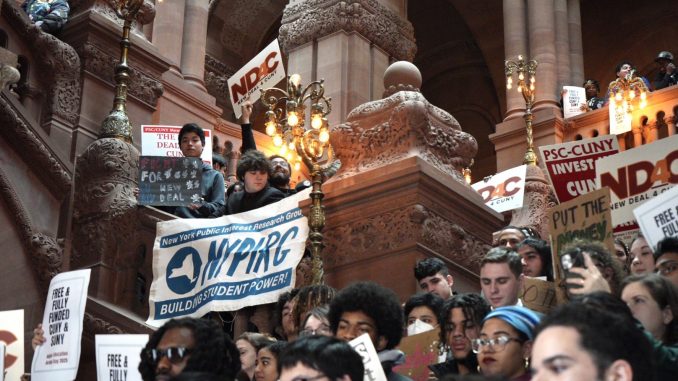
On Feb. 26, hundreds of activists from around New York packed into cars and buses and traveled to Albany to lobby for increased public university funding. In attendance were students from SUNY, CUNY and private schools, as well as members of organizations and labor unions.
As per the constitutionally mandated state budgeting process, each state proposes an executive budget every year, which is released for public review. From mid-January to March 31, agencies and constituents can meet with legislators to advocate for changes to the state budget. Higher Education Action Day is strategically placed during this public review period so that activists’ demands can be voiced during the revision of the budget proposal.
This year, Gov. Hochul proposed spending $1.3 billion on capital projects for CUNY and SUNY institutions. Higher Education Action Day partner organizations like the New York Public Interest Research Group (NYPIRG), Young Invincibles, New York State United Teachers (NYSUT) and CUNY Rising Alliance, stress that this isn’t enough.
In their shared platform used for lobbying, these organizations wrote that the “Executive budget falls short of the reinvestment needed to make up for a generation of disinvestment. That historic disinvestment, coupled with mounting federal threats, leaves our students, faculty, staff and institutions hanging in the balance.”
Second-year SUNY New Paltz art major Ismene Roque said that the actions taken by the current presidential administration are part of what motivated her to lobby in Albany. “I wanted to do something. I just feel like the political climate at the moment can feel a little disheartening.” She wanted to do more to fight what’s happening and thought that Higher Education Action Day was “a good opportunity to feel a part of that fight.”
The organizations at Higher Education Action Day call for “free and fully funded public education.” Among their demands is The New Deal for CUNY bill, which would restore free tuition for CUNY schools. The bill is currently in the Senate Higher Education Committee. In addition, the organizations demand increased community college funding, enhanced services for students with disabilities, expanded financial aid and opportunity programs and investment in sustainable infrastructure.
Tens of thousands of staff and faculty are employed at SUNY schools. According to the Rockefeller Institute of Government, “if SUNY were a private company, it would be among the ten largest employers in New York State.”
The report also detailed that “over a third of workers in New York with a postsecondary credential earned at least one degree from a SUNY campus.”
“I personally went to a SUNY because I thought it would be a more affordable option for me, but it’s still pretty taxing, financially, for my family,” said Kailyn Graham, a first-year sociology major at New Paltz. “If New York should be known for anything it should be education … it’s important to allow citizens and people who live in New York the ability to go to college.”
“I’ve been to two or three Higher Education Action Days in the past, and it’s always so energizing and inspiring,” said Emma Paulsen, NYPIRG’s project coordinator at New Paltz. She thinks “people feel empowered to get involved in state politics this year in particular.”
The day kicked off with a rally event by the Capitol Building’s Million Dollar Staircase. Activists chanted “Education is a right! Fight, Fight, Fight!” and “What do we want? Free SUNY! When do we want it? Now!” while holding colorful handmade signs. Among the speakers at the rally were activists from NYPIRG and Young Initiatives, as well as State Senator Andrew Gounardes who sponsored the New Deal for CUNY bill.
Students then met with New York State Senators and Assemblymembers to discuss higher education demands and share their stories. Sharing from the platform the organizations are basing their lobbying off as well as personal anecdotes, students sought to emphasize the importance of sufficient funding for higher education in New York.
While some representatives were ambivalent about pledging full support to the activists’ demands, others were completely on board. Claire Valdez, who represents the 37th Assembly District in Queens, supports the New Deal for CUNY. She thought “it’s important, because public education should be an entitlement. CUNY was free in the 70s. Austerity measures took that away from us, and we have the resources to bring it back. It’s an incredible working class entitlement that has allowed so many working class and Black and brown New Yorkers to achieve their education.”
There is much to be done before free public higher education becomes a reality. Higher education affordability is a central issue in many students’ lives and in the coming weeks, many of these activists will keep pressuring their representatives to allocate more of the budget to public higher education.
“I think education is the biggest possible head start you can get in life. People who are educated get so much more opportunity.” Roque said. “It’s a human right to be educated.”
